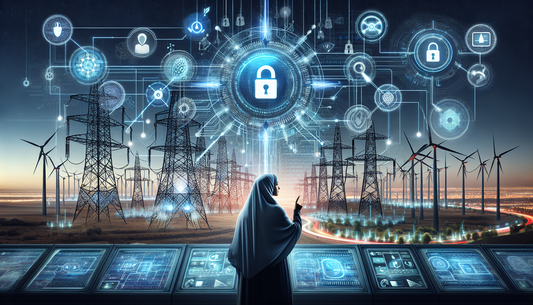Anti-Aging News

Cybersecurity Urgency Rises After Iberian Blackout Exposes Energy V...
The recent blackout across the Iberian Peninsula has intensified the urgency surrounding cybersecurity in the energy sector. On October 14, mainland Spain and Portugal experienced an extensive power outage caused by a cyberattack, unsettling millions and exposing the vulnerabilities within the energy infrastructure. The event highlighted the critical need for enhanced digital defenses.
- 🌍 The blackout impacted large parts of Spain and Portugal, leaving homes and businesses without power for hours.
- 🕒 The cyberattack occurred in the early hours of October 14, with recovery efforts continuing throughout the day.
- 🕵️♂️ Authorities attribute the attack to sophisticated hacking groups targeting critical infrastructure.
- 📉 Energy companies reported significant disruptions, affecting electricity distribution and crippling operations temporarily.
- 🏛️ Government officials in Madrid and Lisbon are collaborating to strengthen defensive measures against future threats.
- 🔍 A joint task force has been established to investigate the incident and bolster the cybersecurity framework.
- ☎️ Citizens voiced concerns over recurring vulnerabilities, urging for better protective measures in the energy sector.
- 💡 Experts emphasize the need for regular cybersecurity audits and investment in advanced security technologies.
This event serves as a stark reminder of the pivotal role cybersecurity plays in maintaining national stability and security in an increasingly digital world.
- Click to read the full article
Cybersecurity Urgency Rises After Iberian Blackout Exposes Energy V...
The recent blackout across the Iberian Peninsula has intensified the urgency surrounding cybersecurity in the energy sector. On October 14, mainland Spain and Portugal experienced an extensive power outage caused by a cyberattack, unsettling millions and exposing the vulnerabilities within the energy infrastructure. The event highlighted the critical need for enhanced digital defenses.
- 🌍 The blackout impacted large parts of Spain and Portugal, leaving homes and businesses without power for hours.
- 🕒 The cyberattack occurred in the early hours of October 14, with recovery efforts continuing throughout the day.
- 🕵️♂️ Authorities attribute the attack to sophisticated hacking groups targeting critical infrastructure.
- 📉 Energy companies reported significant disruptions, affecting electricity distribution and crippling operations temporarily.
- 🏛️ Government officials in Madrid and Lisbon are collaborating to strengthen defensive measures against future threats.
- 🔍 A joint task force has been established to investigate the incident and bolster the cybersecurity framework.
- ☎️ Citizens voiced concerns over recurring vulnerabilities, urging for better protective measures in the energy sector.
- 💡 Experts emphasize the need for regular cybersecurity audits and investment in advanced security technologies.
This event serves as a stark reminder of the pivotal role cybersecurity plays in maintaining national stability and security in an increasingly digital world.
- Click to read the full article

Enhancing Energy Sector Cybersecurity Amid AI's Rising Power Consum...
As artificial intelligence continues to evolve, its impact on energy consumption and cybersecurity in the sector can no longer be overlooked. Recent developments emphasize the need for enhanced cybersecurity measures to protect energy infrastructures from potential threats amidst AI's increasing power demands.
- AI technology is projected to significantly increase power consumption in various industries, driven by its capacity to process vast amounts of data rapidly. 🔌
- The increased energy demand can strain existing infrastructures, potentially leading to vulnerabilities if not properly managed.
- Cybersecurity threats to the energy sector have intensified, with hackers becoming more sophisticated in their methods, targeting both traditional and AI-driven systems.
- Prominent cybersecurity experts, including those from the Cybersecurity and Infrastructure Security Agency (CISA), stress the urgency for robust cyber defenses to safeguard critical energy systems.
- Notable incidents have highlighted the urgency, such as the ransomware attack on the Colonial Pipeline in May 2021, which underscored vulnerabilities in energy supply chains.
- Industry leaders advocate for collaborative efforts between public and private sectors to bolster security measures and ensure resilient, sustainable energy networks.
By proactively enhancing cybersecurity frameworks, the energy sector can efficiently manage AI's power consumption, securing infrastructures and addressing emerging challenges. #EnergySecurity #CyberSecurity #AI
- Click to read the full article
Enhancing Energy Sector Cybersecurity Amid AI's Rising Power Consum...
As artificial intelligence continues to evolve, its impact on energy consumption and cybersecurity in the sector can no longer be overlooked. Recent developments emphasize the need for enhanced cybersecurity measures to protect energy infrastructures from potential threats amidst AI's increasing power demands.
- AI technology is projected to significantly increase power consumption in various industries, driven by its capacity to process vast amounts of data rapidly. 🔌
- The increased energy demand can strain existing infrastructures, potentially leading to vulnerabilities if not properly managed.
- Cybersecurity threats to the energy sector have intensified, with hackers becoming more sophisticated in their methods, targeting both traditional and AI-driven systems.
- Prominent cybersecurity experts, including those from the Cybersecurity and Infrastructure Security Agency (CISA), stress the urgency for robust cyber defenses to safeguard critical energy systems.
- Notable incidents have highlighted the urgency, such as the ransomware attack on the Colonial Pipeline in May 2021, which underscored vulnerabilities in energy supply chains.
- Industry leaders advocate for collaborative efforts between public and private sectors to bolster security measures and ensure resilient, sustainable energy networks.
By proactively enhancing cybersecurity frameworks, the energy sector can efficiently manage AI's power consumption, securing infrastructures and addressing emerging challenges. #EnergySecurity #CyberSecurity #AI
- Click to read the full article

Navigating Europe's Energy Crisis: Challenges and Solutions Ahead
Europe is grappling with a significant energy crisis, prompting nations and leaders to seek innovative solutions to ensure stability and affordability. The crisis, exacerbated by geopolitical tensions and supply chain disruptions, has put the continent's energy security at risk.
- 🚀 The crisis intensified following geopolitical tensions with Russia, a major gas supplier, when it cut supplies to many European countries in 2022.
- 🌐 Countries like Germany and France are leading efforts to diversify energy sources, focusing on renewable energy advancements and LNG imports.
- 📉 Energy prices have skyrocketed, leading to increased energy poverty in vulnerable populations across the continent.
- 🏗️ EU leaders are collaborating on projects to enhance energy infrastructure, including modernizing grids and increasing storage capabilities.
- 💡 Policy reforms, including investment in renewable energy and energy efficiency measures, are underway to reduce dependency on external sources.
- 🤝 In a show of solidarity, European nations are working together to share resources and knowledge to mitigate the impact of the crisis.
- 📅 The European Union has set forth a timeline to reduce reliance on Russian gas by 2030, emphasizing the urgency of these solutions.
As Europe navigates these challenges, the focus remains on sustainable and collaborative solutions to secure its energy future.
- Click to read the full article
Navigating Europe's Energy Crisis: Challenges and Solutions Ahead
Europe is grappling with a significant energy crisis, prompting nations and leaders to seek innovative solutions to ensure stability and affordability. The crisis, exacerbated by geopolitical tensions and supply chain disruptions, has put the continent's energy security at risk.
- 🚀 The crisis intensified following geopolitical tensions with Russia, a major gas supplier, when it cut supplies to many European countries in 2022.
- 🌐 Countries like Germany and France are leading efforts to diversify energy sources, focusing on renewable energy advancements and LNG imports.
- 📉 Energy prices have skyrocketed, leading to increased energy poverty in vulnerable populations across the continent.
- 🏗️ EU leaders are collaborating on projects to enhance energy infrastructure, including modernizing grids and increasing storage capabilities.
- 💡 Policy reforms, including investment in renewable energy and energy efficiency measures, are underway to reduce dependency on external sources.
- 🤝 In a show of solidarity, European nations are working together to share resources and knowledge to mitigate the impact of the crisis.
- 📅 The European Union has set forth a timeline to reduce reliance on Russian gas by 2030, emphasizing the urgency of these solutions.
As Europe navigates these challenges, the focus remains on sustainable and collaborative solutions to secure its energy future.
- Click to read the full article

Zimbabwe Pioneers Energy Reform as Minister Zhemu Soda Speaks at IA...
Zimbabwe is setting a remarkable precedent in energy reforms on the global stage. At the International Atomic Energy Agency (IAE) meeting in Vienna in 2025, Zimbabwe's Minister of Energy, Zhemu Soda, delivered a compelling speech outlining the country's ambitious plans to revolutionize its energy sector. His address highlighted Zimbabwe's commitment to sustainable energy, aiming to harness renewable resources and boost energy security.
- Location: The IAE 2025 meeting took place in Vienna, Austria.
- Speaker: Zhemu Soda, Zimbabwe's Minister of Energy, led the discussion on energy reforms.
- Timeline: The event was held in 2025, as part of the IAE's annual agenda.
- Zimbabwe's Goals: Focus on transitioning to renewable energy sources, such as solar and wind power.
- National Impact: The energy reforms are designed to improve electricity access across Zimbabwe, addressing power shortages.
- Global Collaboration: Zimbabwe is seeking partnerships with international stakeholders to support its energy transformation.
- Expected Outcomes: These reforms aim to increase sustainability, economic growth, and environmental protection, setting a model for other nations.
Zhemu Soda's participation at IAE 2025 marks a significant step for Zimbabwe, emphasizing the nation's innovative approach to energy challenges. 🌟
- Click to read the full article
Zimbabwe Pioneers Energy Reform as Minister Zhemu Soda Speaks at IA...
Zimbabwe is setting a remarkable precedent in energy reforms on the global stage. At the International Atomic Energy Agency (IAE) meeting in Vienna in 2025, Zimbabwe's Minister of Energy, Zhemu Soda, delivered a compelling speech outlining the country's ambitious plans to revolutionize its energy sector. His address highlighted Zimbabwe's commitment to sustainable energy, aiming to harness renewable resources and boost energy security.
- Location: The IAE 2025 meeting took place in Vienna, Austria.
- Speaker: Zhemu Soda, Zimbabwe's Minister of Energy, led the discussion on energy reforms.
- Timeline: The event was held in 2025, as part of the IAE's annual agenda.
- Zimbabwe's Goals: Focus on transitioning to renewable energy sources, such as solar and wind power.
- National Impact: The energy reforms are designed to improve electricity access across Zimbabwe, addressing power shortages.
- Global Collaboration: Zimbabwe is seeking partnerships with international stakeholders to support its energy transformation.
- Expected Outcomes: These reforms aim to increase sustainability, economic growth, and environmental protection, setting a model for other nations.
Zhemu Soda's participation at IAE 2025 marks a significant step for Zimbabwe, emphasizing the nation's innovative approach to energy challenges. 🌟
- Click to read the full article

Spain and Portugal Blackout 2025: Causes and Renewable Energy's Role
In early 2025, Spain and Portugal experienced an unprecedented blackout, plunging parts of the Iberian Peninsula into darkness for several days. Triggered by a combination of outdated infrastructure, climate change impact, and excessive energy demand, this event highlighted significant vulnerabilities in the region’s power network.
- 🌍 The blackout affected major cities including Madrid, Lisbon, and Barcelona, causing disruptions in daily life and economic activities.
- 📅 The crisis began on January 15, 2025, at approximately 2 PM and persisted until January 18, 2025.
- 📉 The event highlighted weaknesses in aging infrastructure strained by climate-induced temperature spikes, which increased electricity demand.
- ⚡ Renewable energy sources such as solar and wind played a crucial role in alleviating the crisis, swiftly compensating for the shortfall in conventional power supplies.
- 🤝 Spain and Portugal collaborated on emergency energy transfers and regional grid stabilization, showcasing the importance of cross-border cooperation.
- 🌱 In response to the blackout, both governments vowed to accelerate the transition towards renewable energy sources, aiming to improve infrastructure resilience and reduce carbon emissions.
This blackout underscored the urgent need for sustainable energy solutions and reinforced the critical role of renewable energy in future-proofing the region against such crises.
- Click to read the full article
Spain and Portugal Blackout 2025: Causes and Renewable Energy's Role
In early 2025, Spain and Portugal experienced an unprecedented blackout, plunging parts of the Iberian Peninsula into darkness for several days. Triggered by a combination of outdated infrastructure, climate change impact, and excessive energy demand, this event highlighted significant vulnerabilities in the region’s power network.
- 🌍 The blackout affected major cities including Madrid, Lisbon, and Barcelona, causing disruptions in daily life and economic activities.
- 📅 The crisis began on January 15, 2025, at approximately 2 PM and persisted until January 18, 2025.
- 📉 The event highlighted weaknesses in aging infrastructure strained by climate-induced temperature spikes, which increased electricity demand.
- ⚡ Renewable energy sources such as solar and wind played a crucial role in alleviating the crisis, swiftly compensating for the shortfall in conventional power supplies.
- 🤝 Spain and Portugal collaborated on emergency energy transfers and regional grid stabilization, showcasing the importance of cross-border cooperation.
- 🌱 In response to the blackout, both governments vowed to accelerate the transition towards renewable energy sources, aiming to improve infrastructure resilience and reduce carbon emissions.
This blackout underscored the urgent need for sustainable energy solutions and reinforced the critical role of renewable energy in future-proofing the region against such crises.
- Click to read the full article

Innovative Smart Grid Transforms Jiangsu's Energy Sector for Sustai...
Jiangsu Province has taken a significant step towards sustainable energy by innovating its smart grid infrastructure, dramatically transforming its energy sector. This major development promises to enhance energy efficiency and reduce carbon emissions, pushing the region towards a greener future.
- The smart grid initiative, spearheaded by the Jiangsu Energy Bureau, integrates advanced technology to optimize energy distribution and consumption. 🌿
- Key areas, including Nanjing and Suzhou, are the primary beneficiaries, witnessing reduced power outages and improved energy efficiency. ⚡️
- The project commenced in January 2022, and by mid-2023, significant infrastructure upgrades had been completed, showcasing impressive progress. 📅
- Collaboration with leading technology firms has been crucial, providing cutting-edge solutions and expertise. 🛠
- This initiative aligns with China's broader goals of achieving carbon neutrality by 2060, positioning Jiangsu as a frontrunner in clean energy adoption. 🌐
- The smart grid's integration of renewable energy sources supports the local economy and creates new jobs in the green sector. 💼
- Citizens report an increase in energy reliability and a decrease in monthly utility bills, enhancing their quality of life. 😊
- Click to read the full article
Innovative Smart Grid Transforms Jiangsu's Energy Sector for Sustai...
Jiangsu Province has taken a significant step towards sustainable energy by innovating its smart grid infrastructure, dramatically transforming its energy sector. This major development promises to enhance energy efficiency and reduce carbon emissions, pushing the region towards a greener future.
- The smart grid initiative, spearheaded by the Jiangsu Energy Bureau, integrates advanced technology to optimize energy distribution and consumption. 🌿
- Key areas, including Nanjing and Suzhou, are the primary beneficiaries, witnessing reduced power outages and improved energy efficiency. ⚡️
- The project commenced in January 2022, and by mid-2023, significant infrastructure upgrades had been completed, showcasing impressive progress. 📅
- Collaboration with leading technology firms has been crucial, providing cutting-edge solutions and expertise. 🛠
- This initiative aligns with China's broader goals of achieving carbon neutrality by 2060, positioning Jiangsu as a frontrunner in clean energy adoption. 🌐
- The smart grid's integration of renewable energy sources supports the local economy and creates new jobs in the green sector. 💼
- Citizens report an increase in energy reliability and a decrease in monthly utility bills, enhancing their quality of life. 😊
- Click to read the full article
